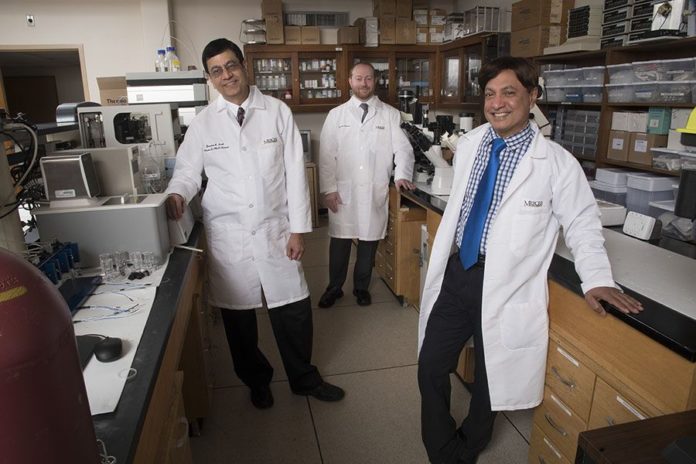Atlanta…The Georgia Research Alliance this week awarded Phase 1 funding to Mercer University College of Pharmacy scientists to assess the viability of forming a new company, DD Therapeutics. The funding provides for scientific and operations development to support DD Therapeutics, including conducting a market analysis, a regulatory review and additional prototype development to assess the viability of bringing its lead product to market.
DD Therapeutics is being formed by College of Pharmacy researchers Ajay Banga, Martin D'Souza and Kevin Murnane to develop new transdermal and nanotechnology drug-delivery systems.
The lead product of DD Therapeutics is a novel transdermal pharmaceutical compound that can be used to treat attention deficit hyperactivity disorder or to control weight through appetite suppression. The transdermal system—a patch that adheres to the skin—is expected to lead to better clinical outcomes than oral delivery, as it will improve patient adherence by reducing the complexity of the dosing regimen. Transdermal delivery also decreases adverse effects by allowing the medication to absorb across the skin directly into the blood supply, bypassing the gastrointestinal tract.
“This is an innovative project because only one similar medication is currently available on the market in transdermal formulation,” says Banga, chair and professor of pharmaceutical sciences, co-director of the Center for Drug Delivery Research and the T.P. Haines Endowed Chair in Transdermal Delivery Systems. “We hope to take potentially even more effective compounds and formulate them into transdermal patches.”
Other products in the DD Therapeutics pipeline include novel drug-delivery nanotechnology developed at Mercer that increases penetration into the brain of treatments for psychiatric and neurological disorders.
“There are many known compounds that are very likely to alleviate the symptoms of such disorders and that also may slow the progression of neurodegenerative disorders, but these compounds cannot be used clinically because they do not penetrate the brain following oral or intravenous administration,” says D'Souza, professor of pharmaceutical sciences, co-director of the Center for Drug Delivery Research and the Dick R. Gourley Chair of Pharmaceutics.
While the brain's protective blood-brain barrier prevents harmful bacteria and viruses from reaching brain tissue, it also stops many potentially useful therapeutics. Nanoparticles currently are used in intravenous solutions to treat cancerous tumors; however, this project is one of the first to develop nanoparticle drug-delivery systems for psychiatric and neurological disorders. The technology is being developed through funding from the National Institutes of Health.
“DD Therapeutics aims to commercialize modified nanoparticles to transport large molecules and water-soluble small molecules into the brain,” says Murnane, assistant professor of pharmaceutical sciences. “This technology could allow numerous drugs that have been abandoned because they do not penetrate the brain to be clinically useful. The modified nanoparticles could benefit the lives of the millions of people suffering from devastating psychiatric and neurological disorders.”
About the College of Pharmacy
Mercer University's College of Pharmacy is ranked among the top five pharmacy programs at private institutions in the United States, according to the 2016 U.S. News & World Report. The college offers doctoral degrees in pharmacy (Pharm.D.) and pharmaceutical sciences (Ph.D.). Founded in 1903 as the independent Southern School of Pharmacy, the school merged with Mercer University in 1959 and in 1981 became the first school in the Southeast to offer the doctor of pharmacy degree as its sole professional degree. In 1988, the College launched its graduate program, offering the Ph.D. degree in pharmaceutical sciences. The College is one of four health sciences units within the Mercer Health Sciences Center. With an enrollment today of more than 670 students and a distinguished faculty of basic scientists and clinicians, the College of Pharmacy houses four centers focusing on research, teaching and learning. The college's motto, “A Tradition of Excellence, a Legacy of Caring,” frames its philosophy of providing excellent academic programs in an environment where every student matters and every person counts. Learn more at http://pharmacy.mercer.edu.









